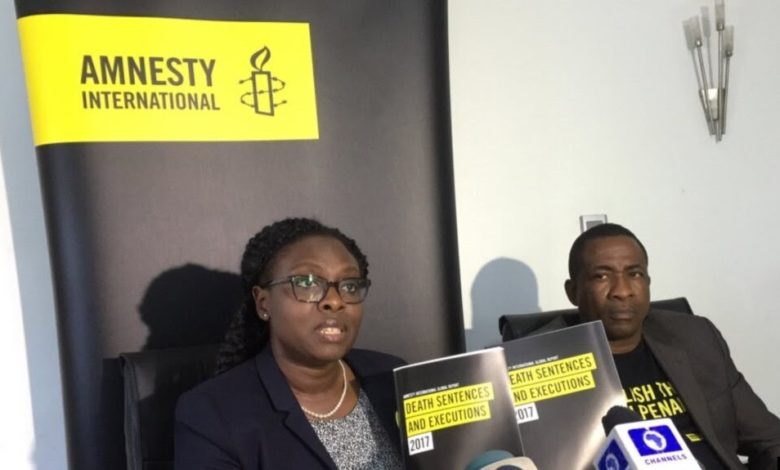Nigerian Authorities Have ‘Utterly Failed’ To Protect Lives, Human Rights — Amnesty Intl’
The group, which turns 60 this year, described the failure to bring violators of human rights to justice as “a stain on Nigeria’s image.”

As it marks its diamond anniversary, Amnesty International has remained worried over human rights violations and growing insecurity in Nigeria.
The London-based research and advocacy organisation said on Friday that the alarming escalation of attacks, kidnapping, and killings in the country shows the government’s “utter failure” to protect lives and properties.
While it was founded in 1961, Amnesty International started activities related to Nigeria in June 1967 due to the outbreak of a civil war that ended three years later.
It had expressed concerns about the neglect of human rights in the country, citing an example of the detention of Nobel Laureate Wole Soyinka for his dissenting views.
“Not much has changed about human rights in Nigeria since 1967,” observed Osai Ojigho, Director Amnesty International Nigeria; “and the concerns remain flagrant disregard for human rights, failure of authorities to protect the people, threats to human rights including the right to freedom of expression, suppression of dissenting voices and lack of accountability.”
“Incessant killings and the stunning failure of the authorities to end them and bring suspected perpetrators to justice have been and continue to be a threat to the right to life in Nigeria.”
“From the days of military’s heavy-handed rule to the years of civil rule and up to today violation of human rights by both state actors and abuses by non-state actors continue to be matters of concern,” she added.
For instance, the organisation explained, since the military era till date, Nigerians have been killed and detained by state forces for protesting increases in tuition, affronts on democracy, police brutality, and harsh economic policies.
“While facing violations or policies that undermine people’s rights, Nigerians always resort to protest – and other peaceful means of seeking change. But the violent clampdown on protests remains a major area of human rights violation. Protest is not a crime and Nigerians must be able to assemble peacefully and express themselves without fear,” said Ojigho.
“We are concerned that the civic space is shrinking and the fear of violence by security forces and sponsored thugs are undermining the right to peaceful protest, and having a profound impact on other human rights.”
Amnesty International described police brutality as one issue that has remained unresolved despite claims of reforms by the government.
Between 2004 and 2020, the group has written at least four comprehensive reports documenting violations by the police, but says culprits are hardly held accountable.
“Rape of women and girls by both the police and security forces, and within their homes and community, is endemic in Nigeria,” it continued. “The government, however, is failing in its constitutional and international human rights obligations to ensure access to justice for victims: suspected perpetrators invariably escape justice, and women and girls who have been raped are denied any form of redress for the serious crimes against them.”
The failure to bring violators to book, it said, is “a stain on Nigeria’s image,” insisting that the criminal justice system must be supported to deliver justice to victims.
It urged the authorities to invest in the welfare of people through basic public services, especially education and healthcare.
The organisation, however, commended successes recorded since Nigeria gained independence in 1960, such as the enactment of the Child Rights Act and Anti-Torture Act.
“At 60, Amnesty International is geared to do more for the protection and promotion of human rights,” Osai assured.
“The organisation will broaden its work in Nigeria to ensure that suspected perpetrators of human rights violations face justice, and that victims enjoy access to effective remedies. The organisation will continue to insist that authorities respect the rights of everyone. People deserved to live with dignity and to enjoy the right to due process of law. Our research work from 1967 shows a pattern of disregard for human rights. This must change.”
Amnesty International’s advocacy in Nigeria has focused on human rights violations within the context of the Boko Haram insurgency, police brutality, environmental degradation, freedom of speech, the rights of health workers, and so on.
But the group has often been treated with hostility by the authorities, especially security agencies.
In Dec. 2018, the Nigerian Army called for its ban after accusing it of making “fictitious claims” regarding the farmer-herder crisis. The group had accused the security forces of “gross incompetence” and doing little to prevent well-coordinated attacks.
Amnesty International’s office in Abuja has also been picketed several times in recent years by groups who appeared to be pro-government.
Support Our Journalism
There are millions of ordinary people affected by conflict in Africa whose stories are missing in the mainstream media. HumAngle is determined to tell those challenging and under-reported stories, hoping that the people impacted by these conflicts will find the safety and security they deserve.
To ensure that we continue to provide public service coverage, we have a small favour to ask you. We want you to be part of our journalistic endeavour by contributing a token to us.
Your donation will further promote a robust, free, and independent media.
Donate HereStay Closer To The Stories That Matter




